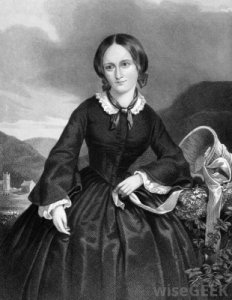 Charlotte Brontë
Charlotte Brontë
English Novelist
1816 – 1855 A.D.
Charlotte Brontë, an English novelist, the author of Jane Eyre. Public interest in Charlotte Brontë was first aroused in 1847. In October of that year there appeared in London a novel that created a sensation, the like of which had not been known since the publication of Waverly. Its stern and paradoxical disregard for the conventional, its masculine energy, and its intense realism, startled the public, and proclaimed to all in accents unmistakable that a new, strange and splendid power had become into literature.
And with the success of Jane Eyre came a lively curiosity to know something of the personality of the author. This was not gratified for some time. There were many conjectures, all of them far amiss. The majority of readers asserted confidently that the work must be that of a man; the touch was unmistakably masculine. At length the mystery was cleared, and the curious world knew that the author of Jane Eyre was the daughter of a clergyman in the little village of Haworth, and that the literary sensation of the day found its source in a nervous, shrinking, awkward, plain, delicate young creature, thirty-one years of age, whose life, with the exception of two years, had been spent on the bleak and dreary moorland of Yorkshire, and for the most part in the narrow confines of a grim gray stone parsonage. There she had lived a pinched and meagre little life, full of sadness and self-denial, with two sisters more delicate than herself, a dissolute brother, and her only parent – a stern and forbidding father. this was no genial environment for an author, even if helpful to her vivid imagination. Nor was it a temporary condition; it was a permanent one. Nearly all the influences in Charlotte Brontë‘s life were such as these, which would seem to cramp if not to stifle sensitive talent.
Her mother died when Charlotte was five years old, and her father, eccentric and solitary in his habits, was ill fitted to replace a mother’s love. In 1824 Charlotte and two older sisters, Maria and Elizabeth, went to a school at Cowan’s Bridge. It was an institution for clergymen’s children, a vivid picture of which appears in Jayne Eyre. It was so badly managed and the food was so poor that many of the children fell sick, among them Maria Brontë, who died in 1825. Elizabeth followed her a few months later, and Charlotte returned to Haworth where she endeavored, together with her sister Emily, to establish a school at home. But pupils were not to be had, and after some years of struggle, and of service as a governess, Charlotte turned her thoughts to literature.
Her first novel was The Professor, and the day the manuscript was returned to her, she began writing Jane Eyre. She finished in 1847, and it was accepted by the publishers promptly upon examination. After its publication, she continued her literary work quietly, and unaffected by the furor she aroused. A few brief visits to London, where attempts were made to lionize her, 0f very much to her distaste – a few literary friendships, notably those with Thackeray, George Henry Lewes, Mrs. Gaskell and Harriet Martineau, were the only features that distinguished her simple life at Haworth.
Shirley was published in 1849, and in 1953 appeared Villette, her last finished work, and the one considered by herself the best.
In June 1854, she married her father’s curate, A. B. Nicholls. It was a happy union, and seemed to assure a period of peace and rest for the sorely tired soul, bu in a few months fate snapped the slender threads of her life, and the sad episode of her existence was ended. She died in March, 1855, of an illness incidental to childbirth.
Thackeray describes her personal appearance:
“I remember the trembling little frame, the little hand, the great honest eyes. I fancied an austere little Joan of Arc marching in upon us, and rebuking our easy lives, our easy morals. She gave me the impression of being a very pure and lofty, and high-minded person. A great and holy reverence of right and truth seemed to be with her always.”
Among literary critics, Frederick Harrison says:
“With all its faults, its narrowness of range, its occasional extravagances, Jayne Eyre will long be remembered as one of the most creative influences of the Victorian literature, one of the most poetic pieces of English romance, and among the most vivid masterpieces in the rare order of literary “confessions,’ – Charlotte Brontë painted not the world, hardly a corner of the world, but the very soul of one proud and loving girl. That is enough; we need ask no more. It was done with consummate power.”
~*~
Reference: Famous Women; An Outline of Feminine Achievement Through the Ages With Life Stories of Five Hundred Noted Women By Joseph Adelman. Copyright, 1926 by Ellis M. Lonow Company.

